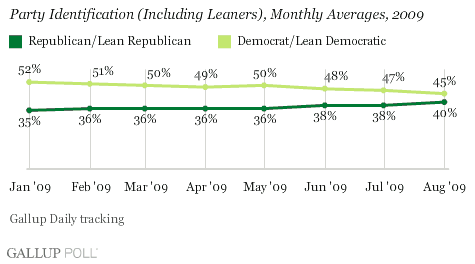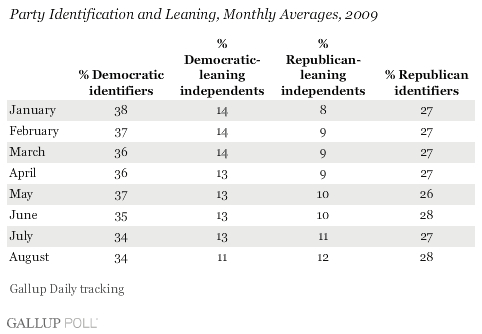PRINCETON, NJ -- In August, an average of 45% of Americans identified as Democrats or leaned to the Democratic Party, while 40% identified as Republicans or leaned to the Republican Party. This 5-point advantage represents a decided narrowing of the gap between the parties from the 17-point Democratic advantage in January.

These results are based on aggregated data from Gallup Daily tracking, consisting of roughly 30,000 interviews with U.S. adults each month. Gallup has observed a similar trend of a declining Democratic advantage in party identification in its 2009 cross-sectional surveys.
The total of 45% current Democratic support derives from 34% of Americans who identify as Democrats and 11% who identify as independents but say they lean to the Democratic Party. The Republican Party's 40% support total includes 28% Republican identifiers and 12% Republican-leaning independents.
The shrinking Democratic-Republican gap since January is due to a decline in Democratic identification (from 38% to 34%) and a shift in the leanings of independents, from largely Democratic to an essentially equal distribution. Importantly, there has been essentially no increase in Republican identification over this time.

Why the Shift?
The narrowing of the gap may be merely a reflection of the difficulties a party has in governing. Democrats began to build up a party-identification advantage in 2005 as George W. Bush's job approval rating sank, which ultimately led to the Democrats' retaking party control of Congress in the 2006 elections and of the presidency in the 2008 election. Possible optimism about a new era of governing led Democrats in 2008 to rise to their greatest position of relative strength in more than two decades. A Gallup analysis found little evidence that the rise in Democratic fortunes was due to an embracing of the party's liberal-leaning issue positions.
Over the course of the year, President Barack Obama's approval rating has declined, particularly during the last two months. While Obama and the Democrats may be accurate in saying they inherited a lot of the problems with which they are currently dealing, Americans show concern about rising federal spending and exploding budget deficits as their political leaders attempt to fix the problems. The debate over healthcare reform is also putting party ideological differences into sharper focus, and Democratic Party leaders have been put on the defensive about some of the key elements for healthcare reform they favor, such as a public-option health insurance plan.
It is important to note, however, that while the Democratic advantage in party support is shrinking, it is not being accompanied by a notable increase in core Republican Party identification. Rather, the shrinking gap is due more to a loss of Democratic support and an increase in "soft" Republican support from a growing proportion of Republican-leaning independents.
Clearly, Republicans are in a better position vis-à-vis the Democrats than they were at the beginning of 2009, which is a positive sign as the 2010 midterm elections draw nearer, but the continued low share of Republican identifiers in the U.S. population is a sign that the GOP still has a way to go to recover its losses over the last few years.
Survey Methods
Results are based on telephone interviews with 31,174 national adults, aged 18 and older, conducted Aug. 1-31, 2009, as part of Gallup Daily tracking. For results based on the total sample of national adults, one can say with 95% confidence that the maximum margin of sampling error is ±1 percentage points.
Interviews are conducted with respondents on land-line telephones (for respondents with a land-line telephone) and cellular phones (for respondents who are cell-phone only).
In addition to sampling error, question wording and practical difficulties in conducting surveys can introduce error or bias into the findings of public opinion polls.
